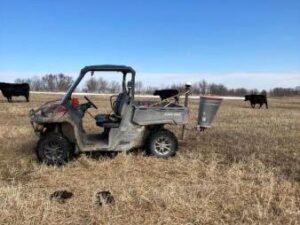AMES, Iowa—The negative impacts of drought, high nitrogen prices and other high prices associated with pasture management have left some pastures in the state in less-than-ideal condition.
As the 2023 growing season approaches, Aaron Saeugling, field agronomist with Iowa State University Extension and Outreach, discusses important considerations when improving thin or over-grazed pastures. A recent article written by Saeugling for ISU Extension and Outreach’s Acreage Living Newsletter highlights these considerations and provides resources for pasture improvement.
According to Saeugling, pastures suffering from thinning can be improved with frost-seeding or interseeding this spring. While frost-seeding and interseeding can be a viable long-term solution for some, it is also important to consider pasture conditions such as soil pH, herbicide use and soil fertility, since not all pastures will be ready to be reseeded without soil amendments. As Saeugling explains, taking the time to properly plan and prepare will help to increase the success of these practices.
As an additional benefit given high nitrogen prices, frost-seeding or interseeding with a legume can help to lessen the amount of nitrogen that needs to be applied to the pasture, since many legumes are capable of fixing nitrogen into the soil.
“Nitrogen fixing legumes should include alfalfa, birdsfoot trefoil, and clover species,” said Saeugling. “Keep in mind with legumes in a pasture, a soil pH above six is best and for alfalfa a soil pH of 6.9.”
Seed placement is another key consideration when frost-seeding or interseeding pastures, as well as seed dispersal method. A drill is preferred for most legumes, as it provides good seed to soil contact. If broadcasting, seeding prior to a snow event can help the seed stick to the surface of the soil.
After frost-seeding or interseeding, it is important to monitor pasture green up and prevent competitive grass species from growing more than 4 inches, as this can result in shading of legume seedlings. Once legume seedlings are established, grazing can be permitted.
For more information on pasture management, a variety of extension resources are available for free from the ISU Extension Store.
Additional Resources
- Interseeding and No-Till Pasture Renovation.
- Improving Pasture by Frost Seeding.
- Selecting Forage Species.
- Fertilizing Pasture.
- Steps to Establish and Maintain Legume-Grass Pastures.
- Pasture Management Guide for Livestock Producers.
Other topics in this month’s newsletter include planting fruit trees, the 2023 Community Food Systems and Farm to School Conference, spring pond management tips, and the Private Well Stewardship Program.
To receive each edition of the Acreage Living Newsletter, sign up online.


(contributed press release, ISUANR)

